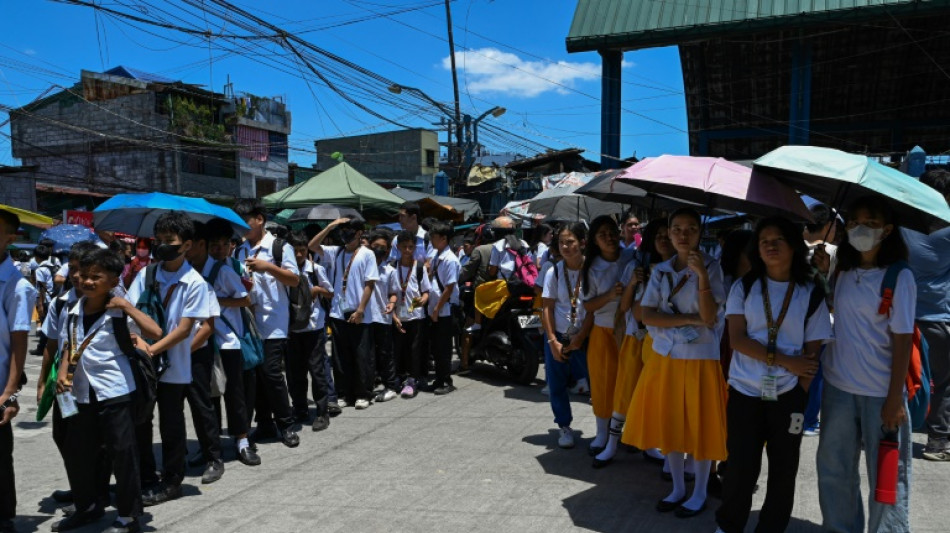
-
 Czech qualifier Bejlek claims first title in Abu Dhabi
Czech qualifier Bejlek claims first title in Abu Dhabi
-
French duo reach Shanghai, completing year-and-a-half walk

-
 Australian snowboarder James eyes elusive Olympic gold
Australian snowboarder James eyes elusive Olympic gold
-
Sequins and snow: Eva Adamczykova makes Olympic return

-
 Vonn set for Olympic medal bid after successful downhill training
Vonn set for Olympic medal bid after successful downhill training
-
Shepherd takes hat-trick as West Indies beat Scotland in T20 World Cup

-
 Sausages will sell after thrill-seeker Von Allmen wins Olympic downhill
Sausages will sell after thrill-seeker Von Allmen wins Olympic downhill
-
Swiss racer Von Allmen wins first gold of Winter Olympics

-
 'Wake up': Mum sparks comeback after scare for freeski star Gu
'Wake up': Mum sparks comeback after scare for freeski star Gu
-
Von Allmen wins men's Olympic downhill gold, first of Games

-
 First medals up for grabs at Winter Olympics
First medals up for grabs at Winter Olympics
-
Afghanistan captain Khan harbours dream of playing in Kabul

-
 Lindsey Vonn completes second Winter Olympics downhill training run
Lindsey Vonn completes second Winter Olympics downhill training run
-
Freeski star Gu survives major scare in Olympic slopestyle

-
 Iran FM looks to more nuclear talks, but warns US
Iran FM looks to more nuclear talks, but warns US
-
Hetmyer's six-hitting steers West Indies to 182-5 against Scotland

-
 After boos for Vance, IOC says it hopes for 'fair play'
After boos for Vance, IOC says it hopes for 'fair play'
-
Thousands gather as Pakistan buries victims of mosque suicide attack

-
 Lindsey Vonn completes second downhill training session
Lindsey Vonn completes second downhill training session
-
US pressing Ukraine and Russia to end war by June, Zelensky says

-
 Faheem blitz sees Pakistan avoid Netherlands shock at T20 World Cup
Faheem blitz sees Pakistan avoid Netherlands shock at T20 World Cup
-
Trump refuses to apologize for racist clip of Obamas as monkeys

-
 Takaichi talks tough on immigration on eve of vote
Takaichi talks tough on immigration on eve of vote
-
England's Salt passed fit for T20 World Cup opener

-
 Spain, Portugal brace for fresh storm after flood deaths
Spain, Portugal brace for fresh storm after flood deaths
-
Pakistan bowl out Netherlands for 147 in T20 World Cup opener

-
 Pushed to margins, women vanish from Bangladesh's political arena
Pushed to margins, women vanish from Bangladesh's political arena
-
Crypto firm accidentally sends $40 bn in bitcoin to users

-
 Pistons end Knicks' NBA winning streak, Celtics edge Heat
Pistons end Knicks' NBA winning streak, Celtics edge Heat
-
Funerals for victims of suicide blast at Islamabad mosque that killed at least 31

-
 A tale of two villages: Cambodians lament Thailand's border gains
A tale of two villages: Cambodians lament Thailand's border gains
-
Police identify suspect in disappearance of Australian boy

-
 Cuba adopts urgent measures to address energy crisis: minister
Cuba adopts urgent measures to address energy crisis: minister
-
Not-so-American football: the Super Bowl's overseas stars

-
 Trump says US talks with Iran 'very good,' more negotiations expected
Trump says US talks with Iran 'very good,' more negotiations expected
-
Trump administration re-approves twice-banned pesticide

-
 Hisatsune leads Matsuyama at Phoenix Open as Scheffler makes cut
Hisatsune leads Matsuyama at Phoenix Open as Scheffler makes cut
-
Beyond the QBs: 5 Super Bowl players to watch

-
 Grass v artificial turf: Super Bowl players speak out
Grass v artificial turf: Super Bowl players speak out
-
Police warn Sydney protesters ahead of Israeli president's visit

-
 Bolivia wants closer US ties, without alienating China: minister
Bolivia wants closer US ties, without alienating China: minister
-
Ex-MLB outfielder Puig guilty in federal sports betting case

-
 Milan-Cortina Winter Olympics open with dazzling ceremony
Milan-Cortina Winter Olympics open with dazzling ceremony
-
China overturns death sentence for Canadian in drug case

-
 Trump reinstates commercial fishing in protected Atlantic waters
Trump reinstates commercial fishing in protected Atlantic waters
-
Man Utd can't rush manager choice: Carrick

-
 Leeds boost survival bid with win over relegation rivals Forest
Leeds boost survival bid with win over relegation rivals Forest
-
Stars, Clydesdales and an AI beef jostle for Super Bowl ad glory

-
 Dow surges above 50,000 for first time as US stocks regain mojo
Dow surges above 50,000 for first time as US stocks regain mojo
-
Freeski star Gu says injuries hit confidence as she targets Olympic treble


School's out: how climate change threatens education
Record-breaking heat last month that prompted governments in Asia to close schools offers fresh evidence of how climate change is threatening the education of millions of children.
The arrival of seasonal rains has now brought relief to some parts of the region, but experts warn the broader problem remains, and many countries are poorly prepared to handle the impacts of climate change on schooling.
Asia is warming faster than the global average, and climate change is producing more frequent, longer, and more intense heatwaves.
But heat is not the only challenge.
A warmer atmosphere holds more moisture, which can result in heavy rains and flooding.
This can damage schools or put them out of commission while they are used as shelters.
Hot weather can also drive wildfires and spikes in air pollution, which have caused school closures everywhere from India to Australia.
"The climate crisis is already a reality for children in East Asia and Pacific," the UN children's agency UNICEF warned last year.
Mohua Akter Nur, 13, is living proof of that claim, sweltering in a one-room home in Bangladesh's capital Dhaka after her school closed.
Intermittent electricity means she cannot even rely on a fan to cool the cramped dwelling.
"The heat is intolerable," she told AFP last month.
"Our school is shut, but I can't study at home."
- Poorest hit hardest -
April marked the 11th straight month of record global heat, and the pattern is clear in Bangladesh, said Shumon Sengupta, country director for NGO Save the Children.
"Not only are the temperatures higher, the duration of the high temperatures is much longer," he told AFP.
"Previously, few areas used to have these heatwaves, now the coverage of the country is much higher," he added.
Schools across much of Asia are simply not equipped to deal with the growing consequences of climate change.
Bangladesh's urban schools can be sturdy, but are often overcrowded, with little ventilation, said Sengupta.
In rural areas, corrugated metal roofs can turn classrooms into ovens, and electricity for fans is unreliable.
In Bangladesh and elsewhere, students often walk long distances to and from school, risking heatstroke in the process.
But closing schools comes with serious consequences, "particularly for children from poorer, vulnerable communities who do not have access to resources such as computers, internet and books," said Salwa Aleryani, UNICEF's health specialist for East Asia and the Pacific.
Those children "are also less likely to have better conditions at home to protect them during heatwaves".
They may be left unsupervised by parents who cannot afford to stay home, and school closures put children at higher risk of child labour, child marriage and even trafficking, said Sengupta.
- 'Wake up to this' -
Climate change also threatens schooling indirectly.
UNICEF research in Myanmar found that crop shortages caused by rising temperatures and unpredictable rain caused families to pull children from school to help with work or because they could no longer afford fees.
Some wealthy countries in the region have taken steps to protect children's education in the face of a changing climate.
In Japan, fewer than half of all public schools had air conditioning in 2018, but that figure jumped to over 95 percent by 2022 after a series of heatwaves.
Not all impacts can be mitigated, however, even in developed economies.
Australian authorities have repeatedly closed schools because of wildfires, and research has found long-term impacts on learning among students whose communities were worst affected.
Developing countries in the region need help to invest in upgrading infrastructure, said Sengupta, but the only real solution to the crisis lies in tackling the root cause: climate change.
"It's very important for government and policymakers to really, really wake up on this," he said.
"The climate crisis is a child crisis. Adults are causing the crisis, but it's children who are impacted the most."
Y.Zaher--SF-PST

